Leadership and Management in Service Industries: Past, Present, Future
VerifiedAdded on 2023/01/23
|21
|1481
|56
Presentation
AI Summary
This presentation explores leadership and management principles, organizational culture, and leadership styles within the service industry, with a focus on the hospitality sector. It begins by examining classical management theories and their application, followed by an analysis of different organizational cultures, including Handy's theory, and the roles of leaders and managers. The presentation then delves into leadership styles, contrasting past, present, and future approaches, with a specific focus on the Laissez leadership style and its advantages and disadvantages. The impact of external factors like technology and internal factors like human resources on leadership and management activities is also discussed, concluding with a summary of key findings and references.
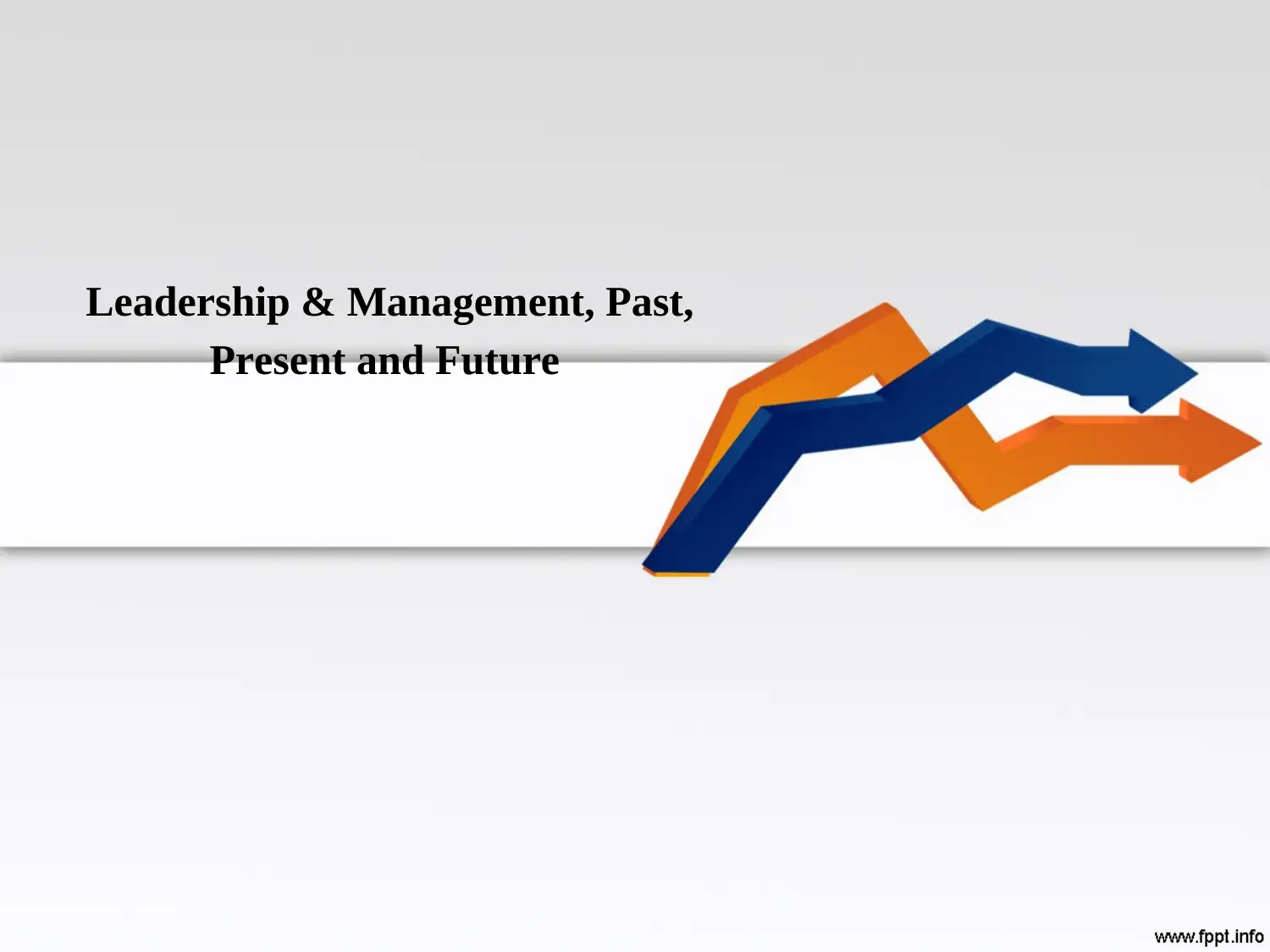
Leadership & Management, Past,
Present and Future
Present and Future
Paraphrase This Document
Need a fresh take? Get an instant paraphrase of this document with our AI Paraphraser
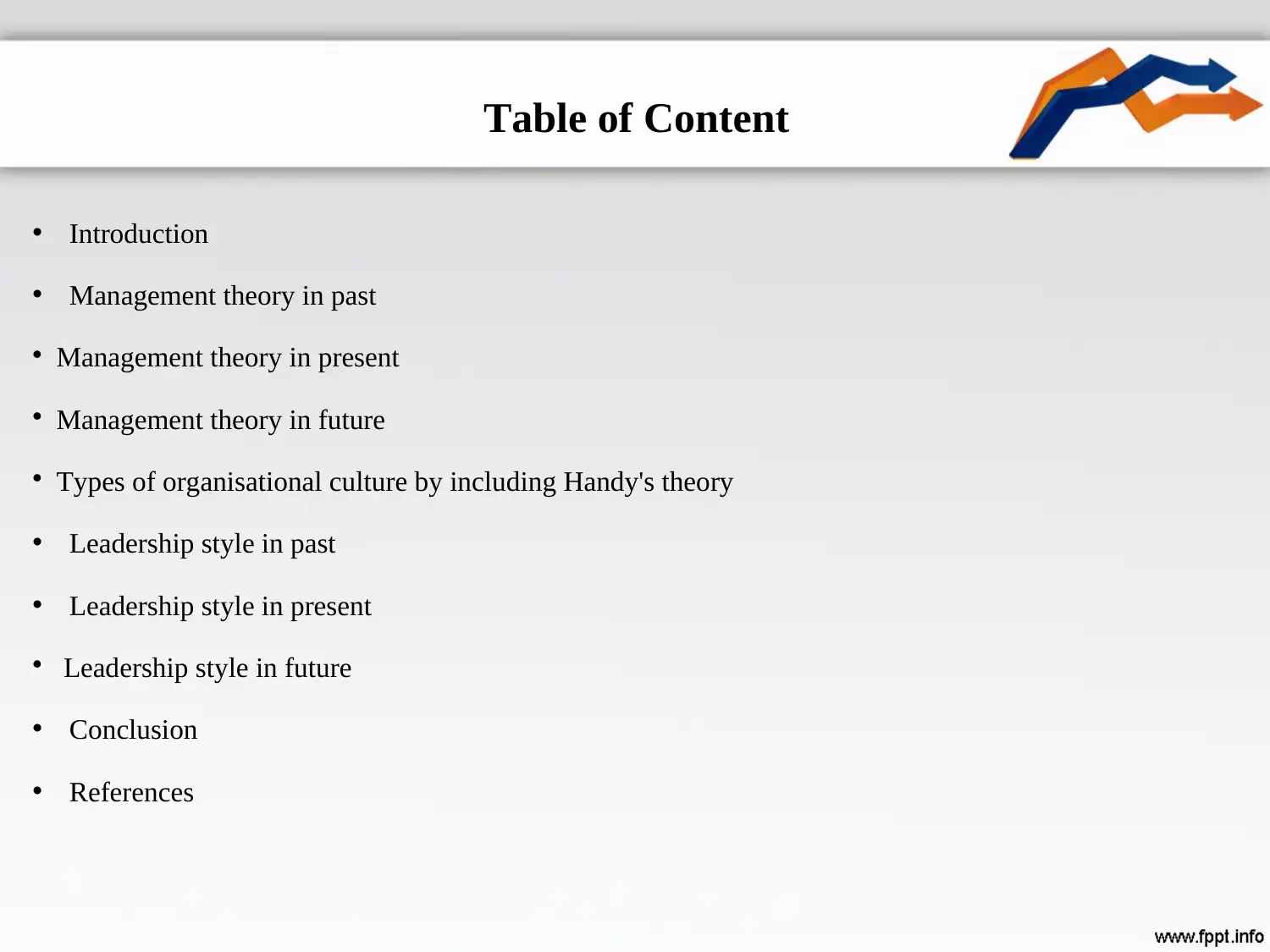
Table of Content
• Introduction
• Management theory in past
Management theory in present
Management theory in future
Types of organisational culture by including Handy's theory
• Leadership style in past
• Leadership style in present
Leadership style in future
• Conclusion
• References
• Introduction
• Management theory in past
Management theory in present
Management theory in future
Types of organisational culture by including Handy's theory
• Leadership style in past
• Leadership style in present
Leadership style in future
• Conclusion
• References
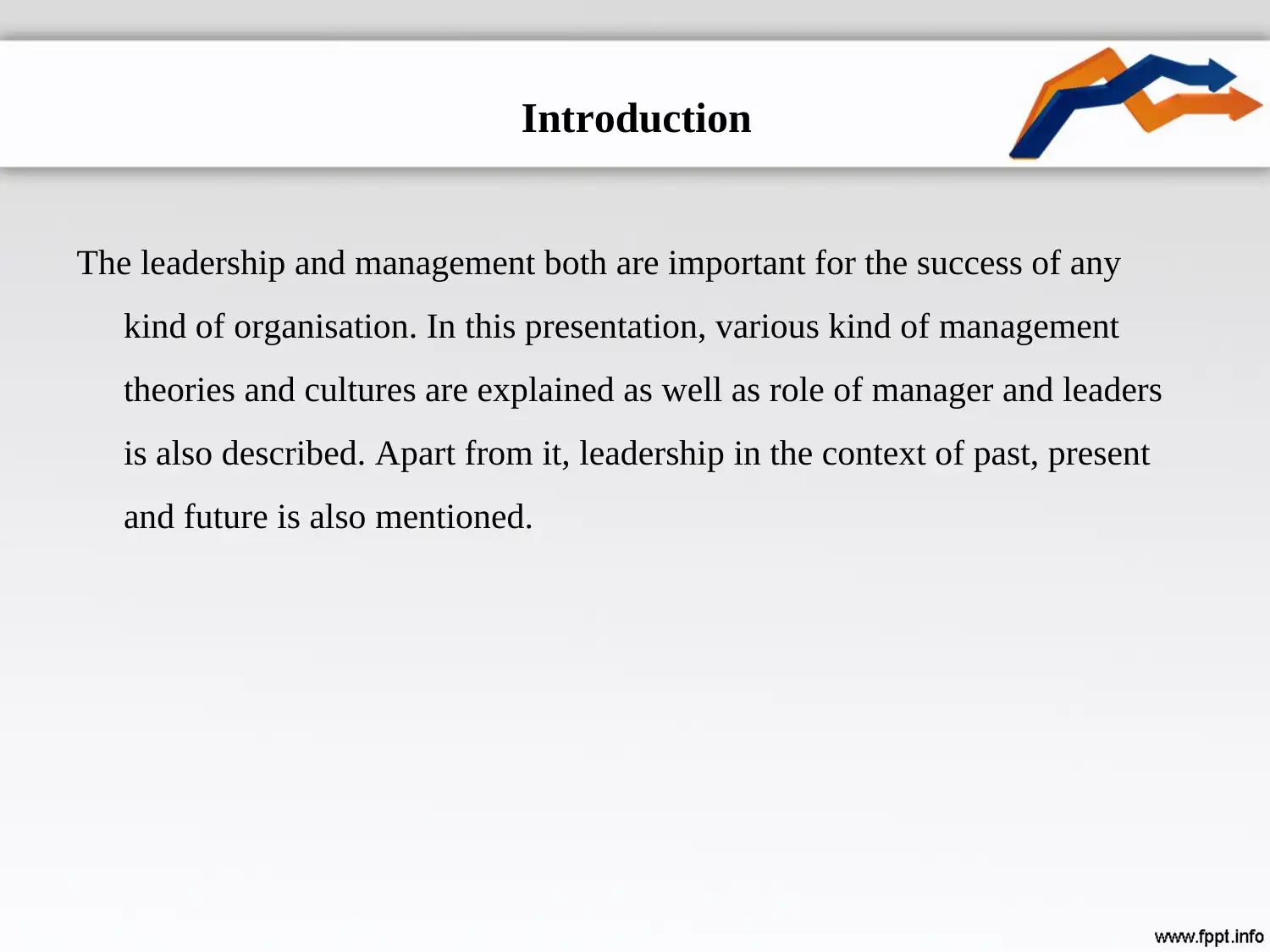
Introduction
The leadership and management both are important for the success of any
kind of organisation. In this presentation, various kind of management
theories and cultures are explained as well as role of manager and leaders
is also described. Apart from it, leadership in the context of past, present
and future is also mentioned.
The leadership and management both are important for the success of any
kind of organisation. In this presentation, various kind of management
theories and cultures are explained as well as role of manager and leaders
is also described. Apart from it, leadership in the context of past, present
and future is also mentioned.
⊘ This is a preview!⊘
Do you want full access?
Subscribe today to unlock all pages.

Trusted by 1+ million students worldwide
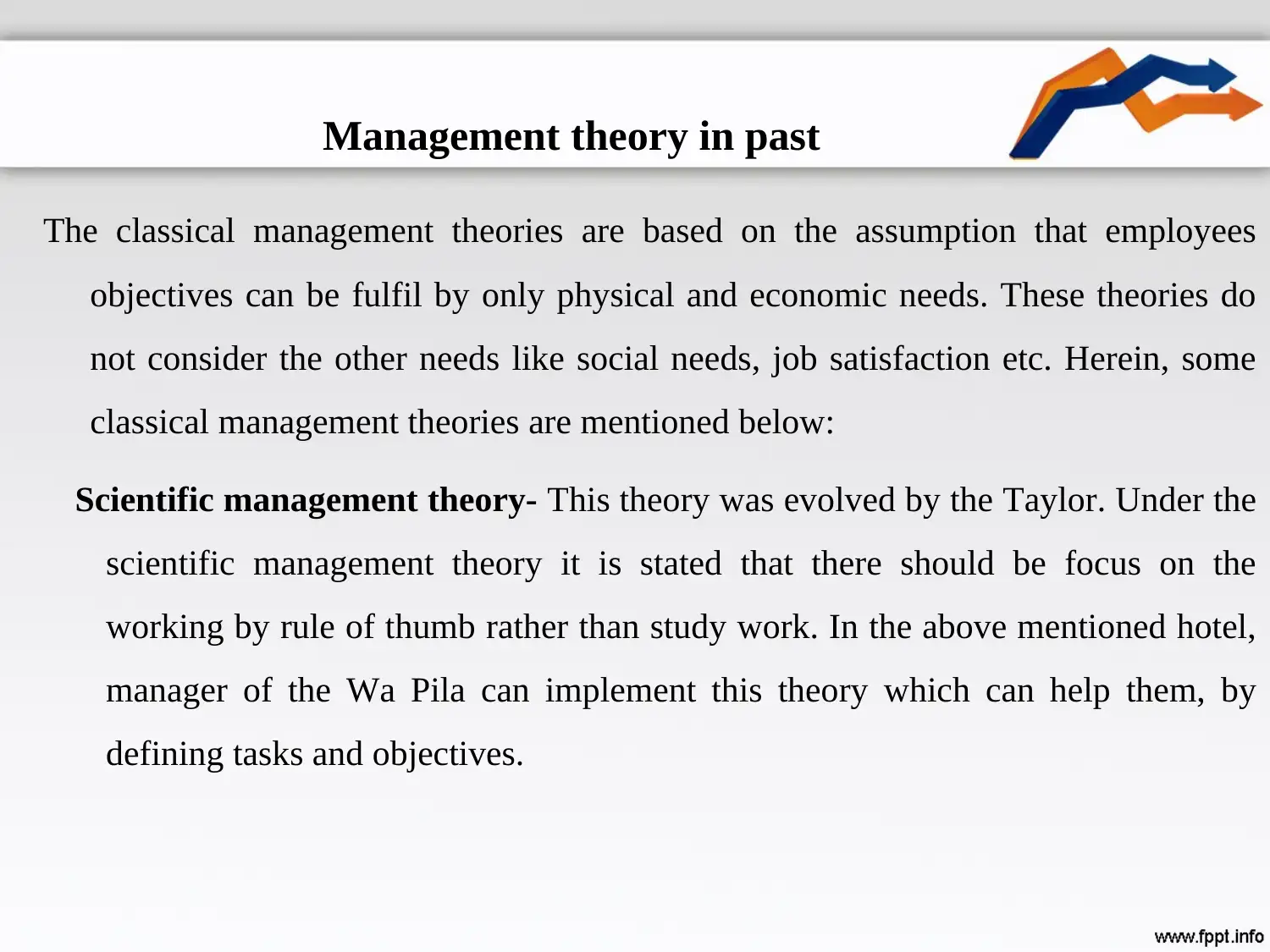
Management theory in past
The classical management theories are based on the assumption that employees
objectives can be fulfil by only physical and economic needs. These theories do
not consider the other needs like social needs, job satisfaction etc. Herein, some
classical management theories are mentioned below:
Scientific management theory- This theory was evolved by the Taylor. Under the
scientific management theory it is stated that there should be focus on the
working by rule of thumb rather than study work. In the above mentioned hotel,
manager of the Wa Pila can implement this theory which can help them, by
defining tasks and objectives.
The classical management theories are based on the assumption that employees
objectives can be fulfil by only physical and economic needs. These theories do
not consider the other needs like social needs, job satisfaction etc. Herein, some
classical management theories are mentioned below:
Scientific management theory- This theory was evolved by the Taylor. Under the
scientific management theory it is stated that there should be focus on the
working by rule of thumb rather than study work. In the above mentioned hotel,
manager of the Wa Pila can implement this theory which can help them, by
defining tasks and objectives.
Paraphrase This Document
Need a fresh take? Get an instant paraphrase of this document with our AI Paraphraser
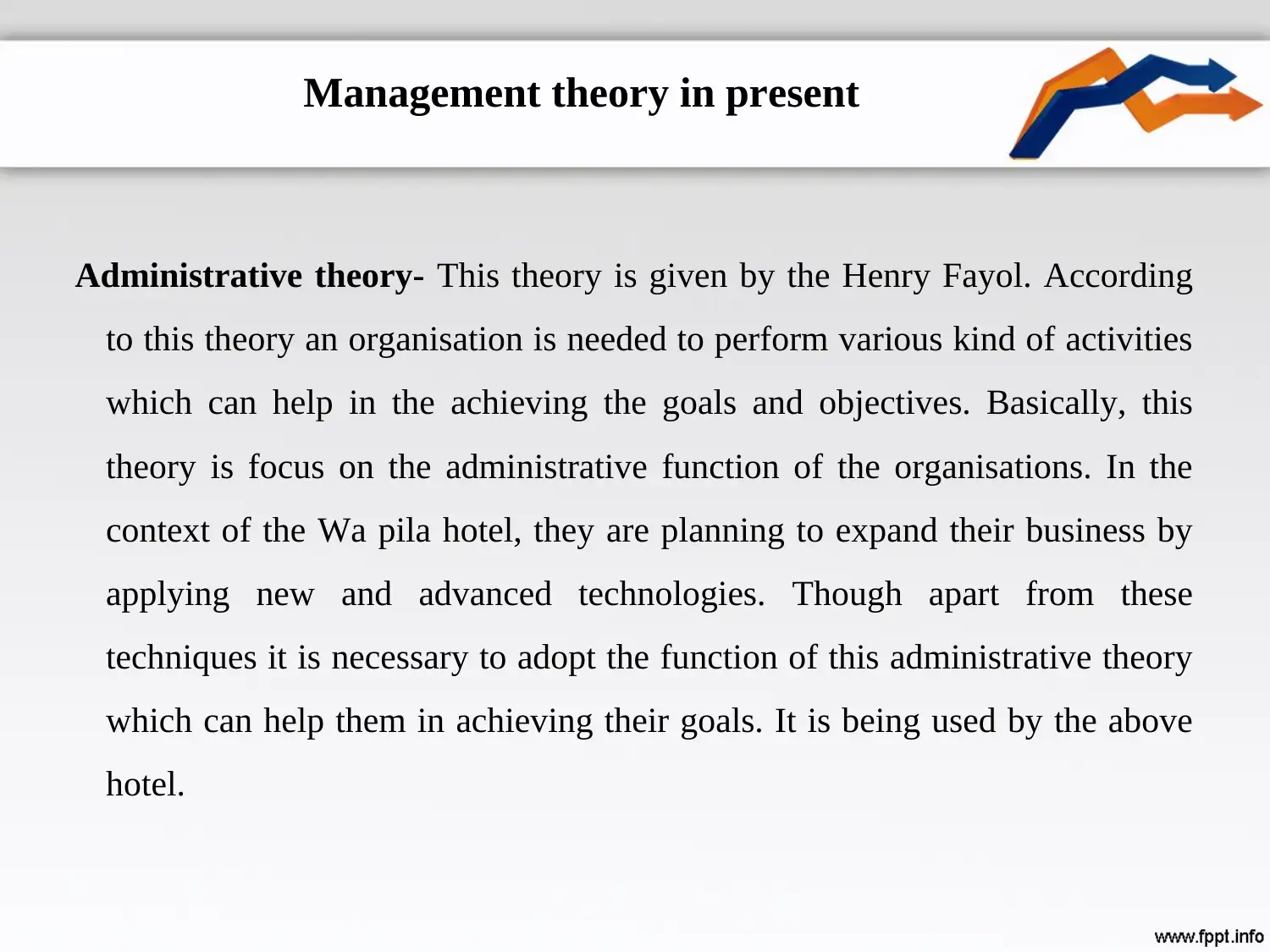
Management theory in present
Administrative theory- This theory is given by the Henry Fayol. According
to this theory an organisation is needed to perform various kind of activities
which can help in the achieving the goals and objectives. Basically, this
theory is focus on the administrative function of the organisations. In the
context of the Wa pila hotel, they are planning to expand their business by
applying new and advanced technologies. Though apart from these
techniques it is necessary to adopt the function of this administrative theory
which can help them in achieving their goals. It is being used by the above
hotel.
Administrative theory- This theory is given by the Henry Fayol. According
to this theory an organisation is needed to perform various kind of activities
which can help in the achieving the goals and objectives. Basically, this
theory is focus on the administrative function of the organisations. In the
context of the Wa pila hotel, they are planning to expand their business by
applying new and advanced technologies. Though apart from these
techniques it is necessary to adopt the function of this administrative theory
which can help them in achieving their goals. It is being used by the above
hotel.
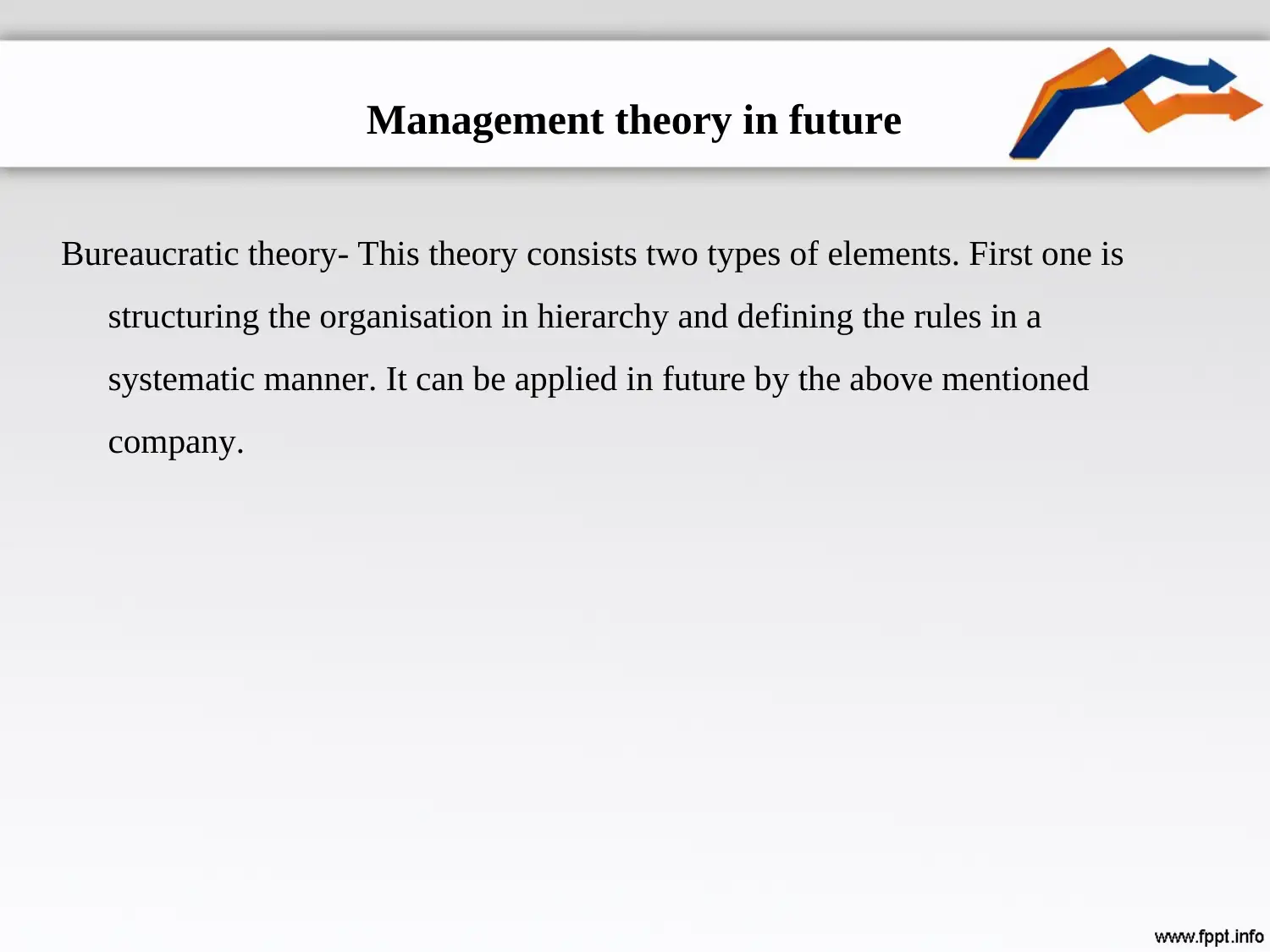
Management theory in future
Bureaucratic theory- This theory consists two types of elements. First one is
structuring the organisation in hierarchy and defining the rules in a
systematic manner. It can be applied in future by the above mentioned
company.
Bureaucratic theory- This theory consists two types of elements. First one is
structuring the organisation in hierarchy and defining the rules in a
systematic manner. It can be applied in future by the above mentioned
company.
⊘ This is a preview!⊘
Do you want full access?
Subscribe today to unlock all pages.

Trusted by 1+ million students worldwide
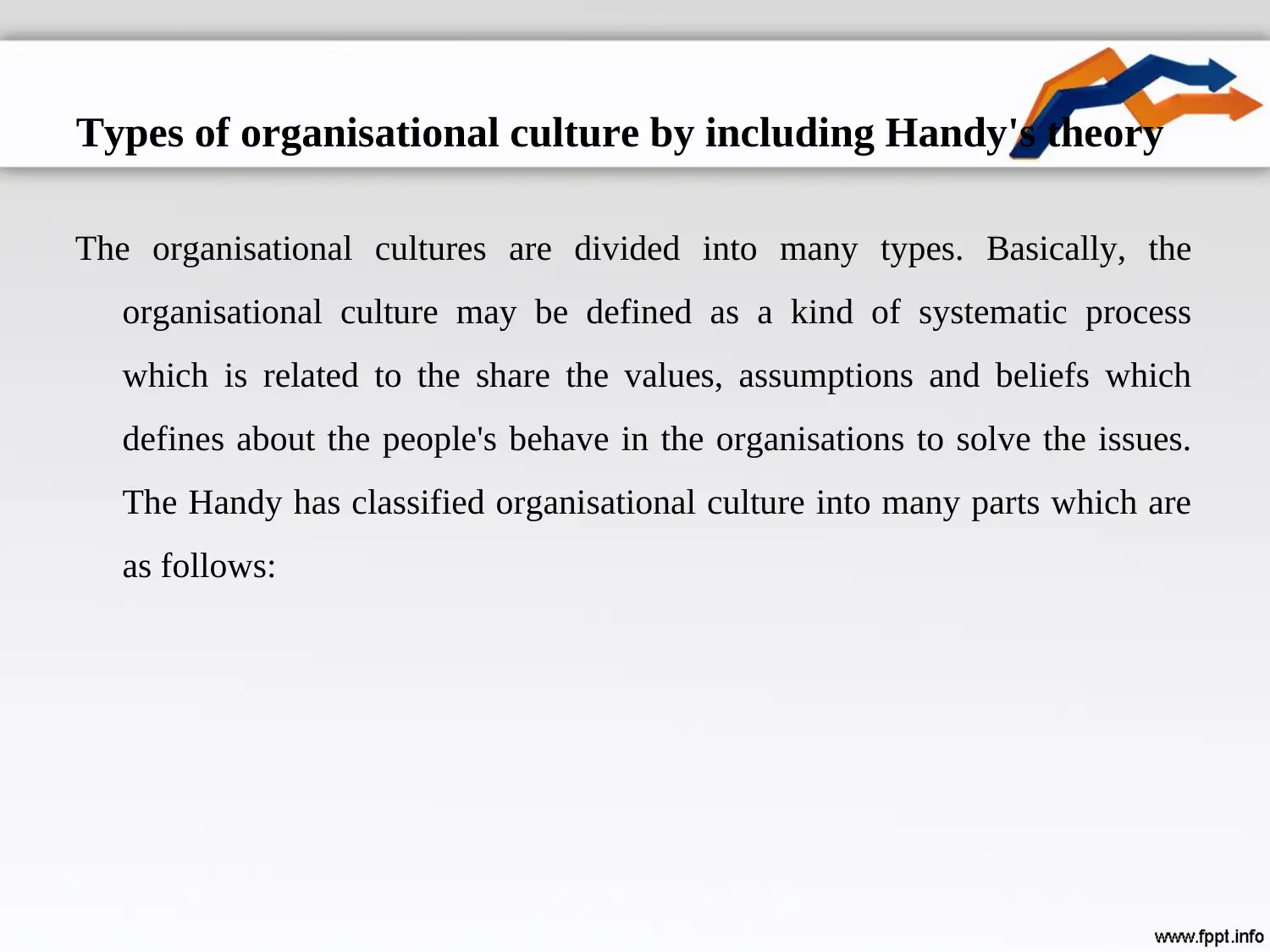
Types of organisational culture by including Handy's theory
The organisational cultures are divided into many types. Basically, the
organisational culture may be defined as a kind of systematic process
which is related to the share the values, assumptions and beliefs which
defines about the people's behave in the organisations to solve the issues.
The Handy has classified organisational culture into many parts which are
as follows:
The organisational cultures are divided into many types. Basically, the
organisational culture may be defined as a kind of systematic process
which is related to the share the values, assumptions and beliefs which
defines about the people's behave in the organisations to solve the issues.
The Handy has classified organisational culture into many parts which are
as follows:
Paraphrase This Document
Need a fresh take? Get an instant paraphrase of this document with our AI Paraphraser
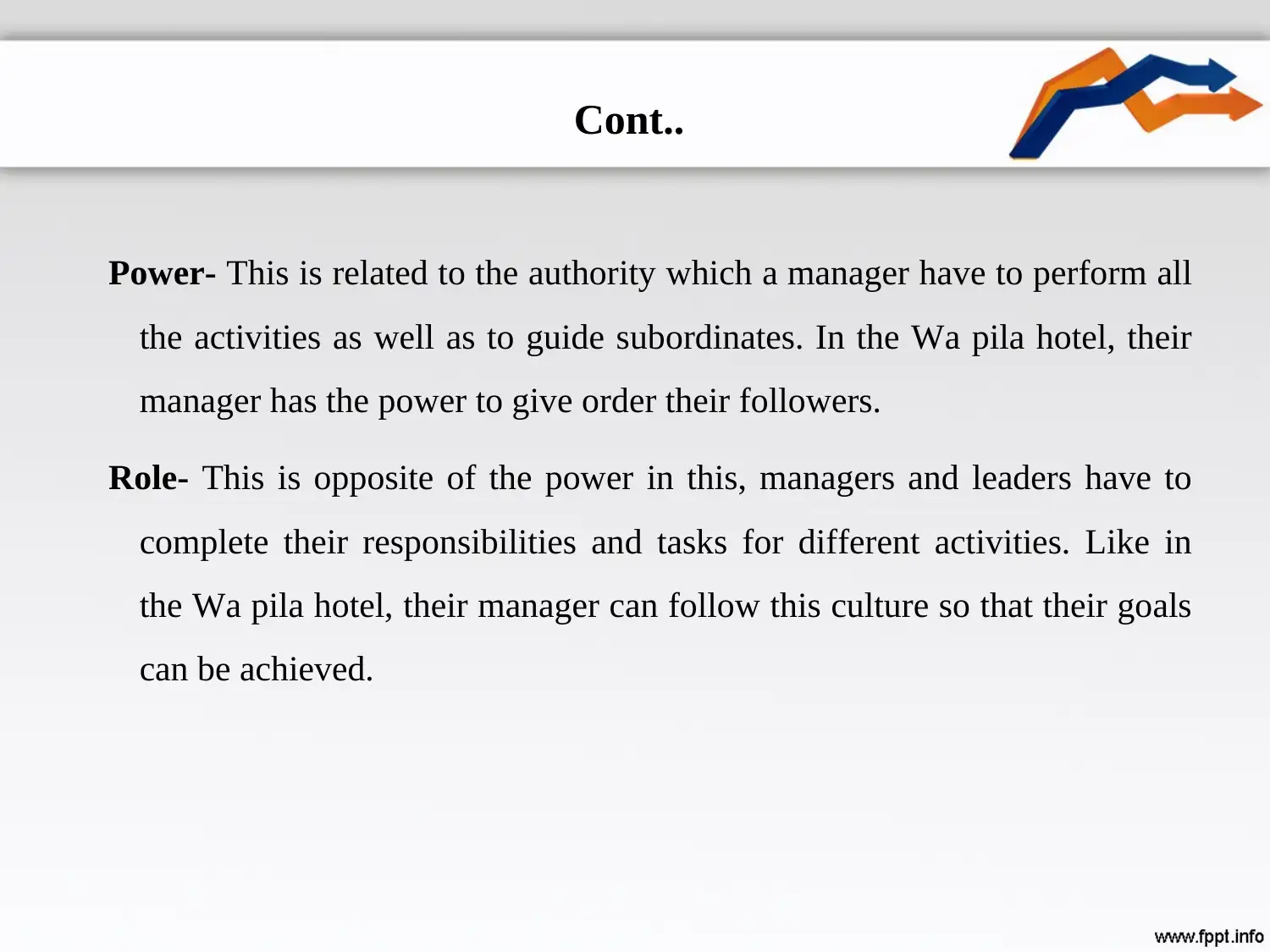
Cont..
Power- This is related to the authority which a manager have to perform all
the activities as well as to guide subordinates. In the Wa pila hotel, their
manager has the power to give order their followers.
Role- This is opposite of the power in this, managers and leaders have to
complete their responsibilities and tasks for different activities. Like in
the Wa pila hotel, their manager can follow this culture so that their goals
can be achieved.
Power- This is related to the authority which a manager have to perform all
the activities as well as to guide subordinates. In the Wa pila hotel, their
manager has the power to give order their followers.
Role- This is opposite of the power in this, managers and leaders have to
complete their responsibilities and tasks for different activities. Like in
the Wa pila hotel, their manager can follow this culture so that their goals
can be achieved.
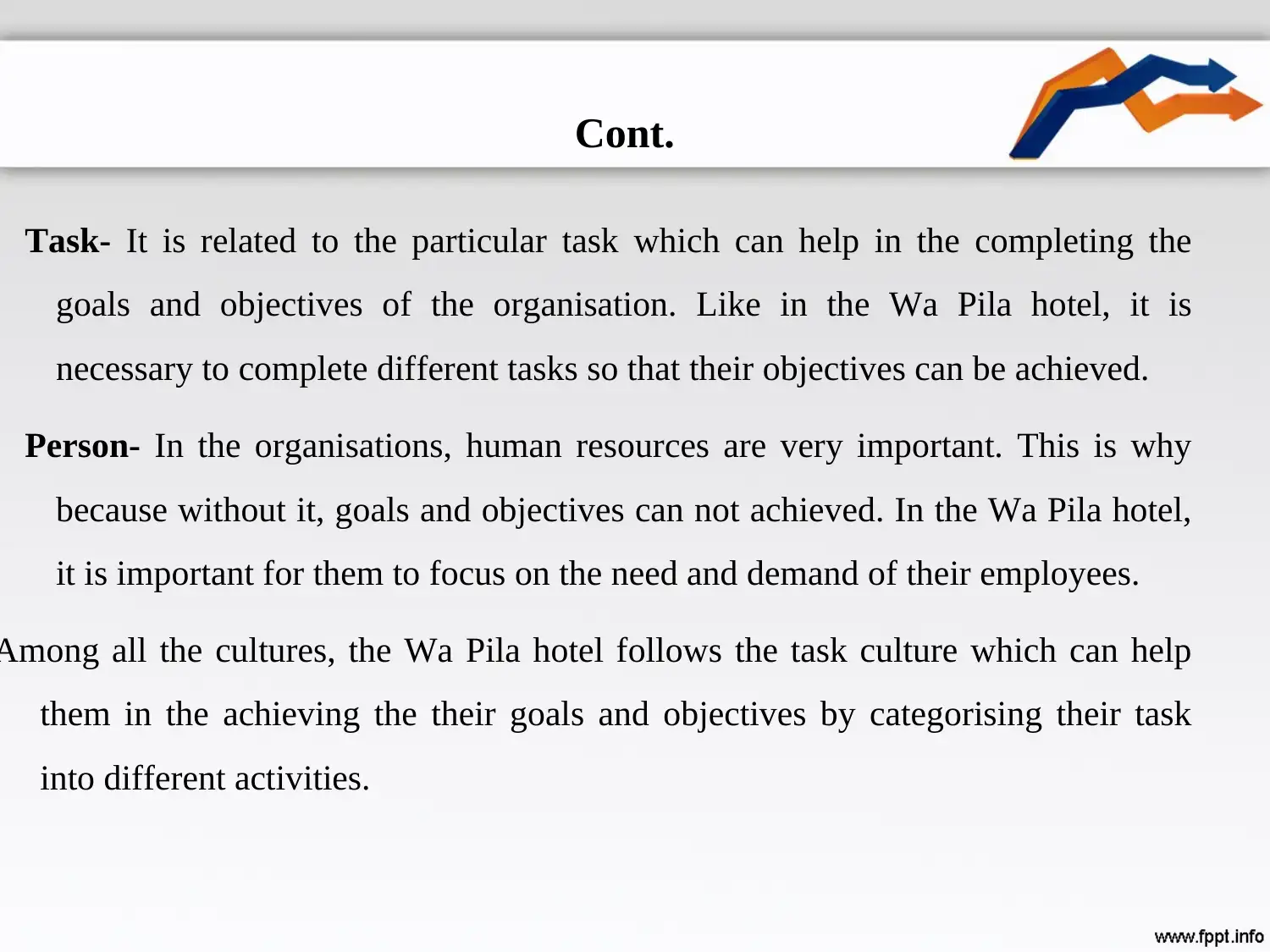
Cont.
Task- It is related to the particular task which can help in the completing the
goals and objectives of the organisation. Like in the Wa Pila hotel, it is
necessary to complete different tasks so that their objectives can be achieved.
Person- In the organisations, human resources are very important. This is why
because without it, goals and objectives can not achieved. In the Wa Pila hotel,
it is important for them to focus on the need and demand of their employees.
Among all the cultures, the Wa Pila hotel follows the task culture which can help
them in the achieving the their goals and objectives by categorising their task
into different activities.
Task- It is related to the particular task which can help in the completing the
goals and objectives of the organisation. Like in the Wa Pila hotel, it is
necessary to complete different tasks so that their objectives can be achieved.
Person- In the organisations, human resources are very important. This is why
because without it, goals and objectives can not achieved. In the Wa Pila hotel,
it is important for them to focus on the need and demand of their employees.
Among all the cultures, the Wa Pila hotel follows the task culture which can help
them in the achieving the their goals and objectives by categorising their task
into different activities.
⊘ This is a preview!⊘
Do you want full access?
Subscribe today to unlock all pages.

Trusted by 1+ million students worldwide
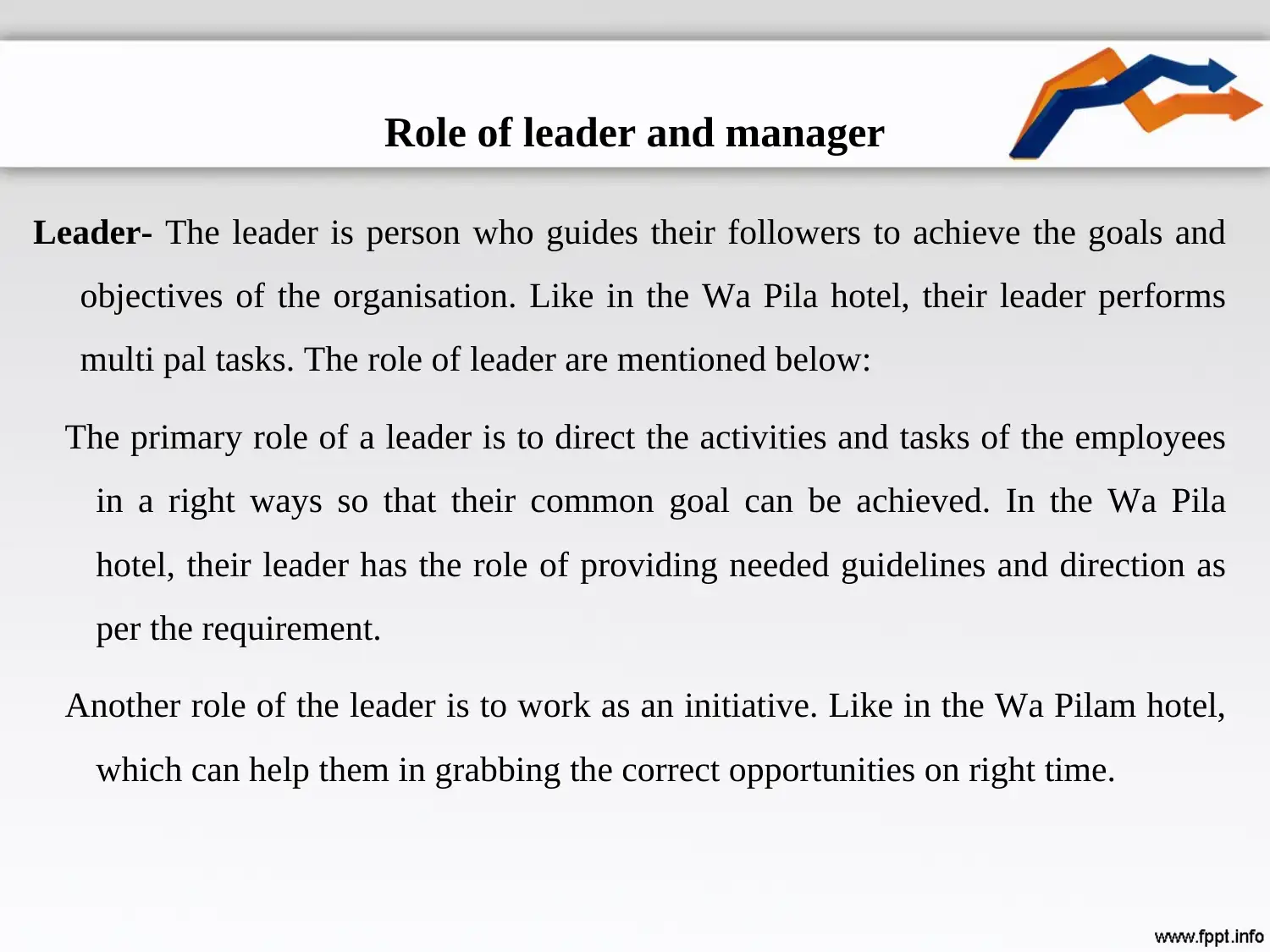
Role of leader and manager
Leader- The leader is person who guides their followers to achieve the goals and
objectives of the organisation. Like in the Wa Pila hotel, their leader performs
multi pal tasks. The role of leader are mentioned below:
The primary role of a leader is to direct the activities and tasks of the employees
in a right ways so that their common goal can be achieved. In the Wa Pila
hotel, their leader has the role of providing needed guidelines and direction as
per the requirement.
Another role of the leader is to work as an initiative. Like in the Wa Pilam hotel,
which can help them in grabbing the correct opportunities on right time.
Leader- The leader is person who guides their followers to achieve the goals and
objectives of the organisation. Like in the Wa Pila hotel, their leader performs
multi pal tasks. The role of leader are mentioned below:
The primary role of a leader is to direct the activities and tasks of the employees
in a right ways so that their common goal can be achieved. In the Wa Pila
hotel, their leader has the role of providing needed guidelines and direction as
per the requirement.
Another role of the leader is to work as an initiative. Like in the Wa Pilam hotel,
which can help them in grabbing the correct opportunities on right time.
Paraphrase This Document
Need a fresh take? Get an instant paraphrase of this document with our AI Paraphraser
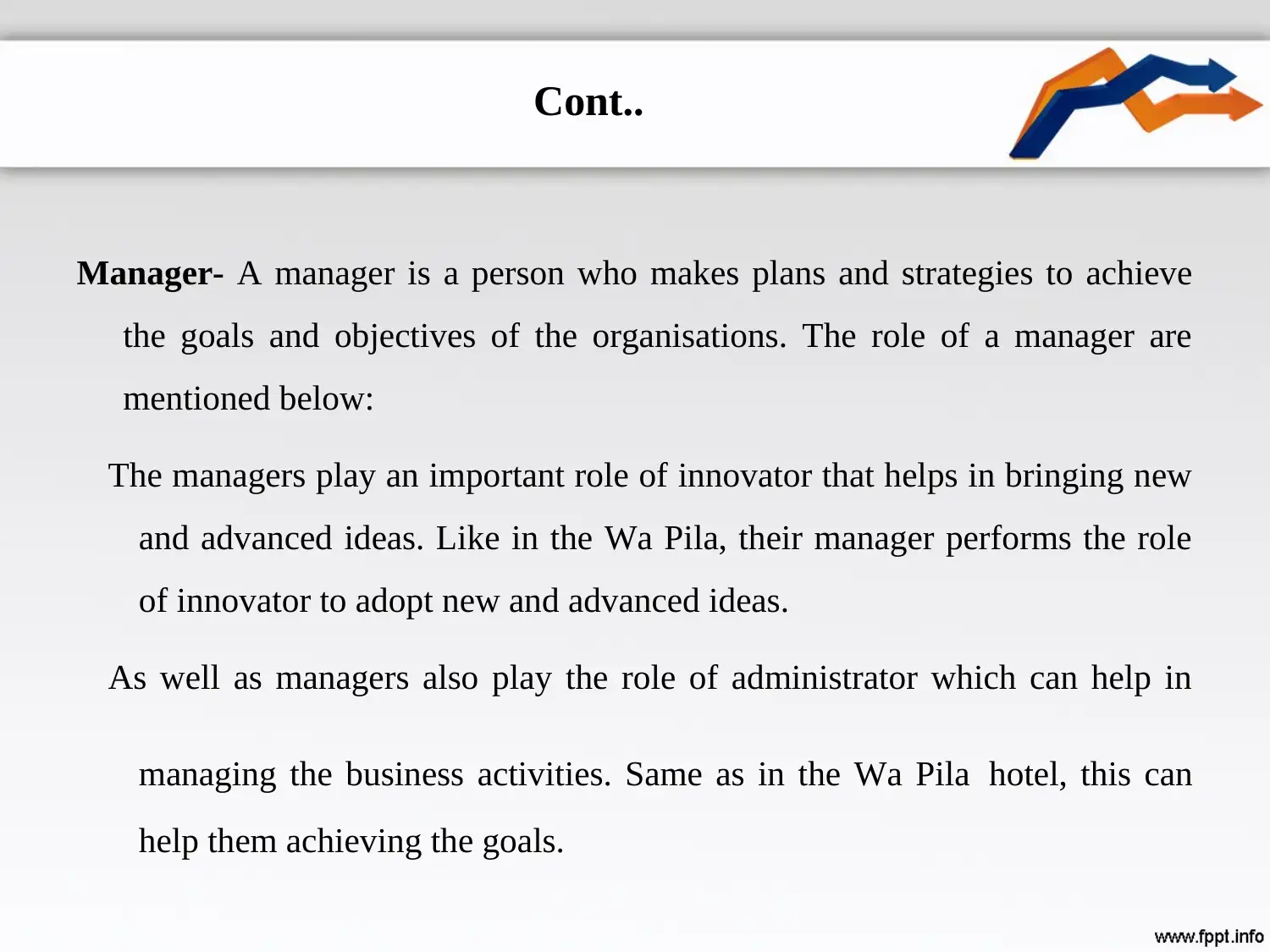
Cont..
Manager- A manager is a person who makes plans and strategies to achieve
the goals and objectives of the organisations. The role of a manager are
mentioned below:
The managers play an important role of innovator that helps in bringing new
and advanced ideas. Like in the Wa Pila, their manager performs the role
of innovator to adopt new and advanced ideas.
As well as managers also play the role of administrator which can help in
managing the business activities. Same as in the Wa Pila hotel, this can
help them achieving the goals.
Manager- A manager is a person who makes plans and strategies to achieve
the goals and objectives of the organisations. The role of a manager are
mentioned below:
The managers play an important role of innovator that helps in bringing new
and advanced ideas. Like in the Wa Pila, their manager performs the role
of innovator to adopt new and advanced ideas.
As well as managers also play the role of administrator which can help in
managing the business activities. Same as in the Wa Pila hotel, this can
help them achieving the goals.
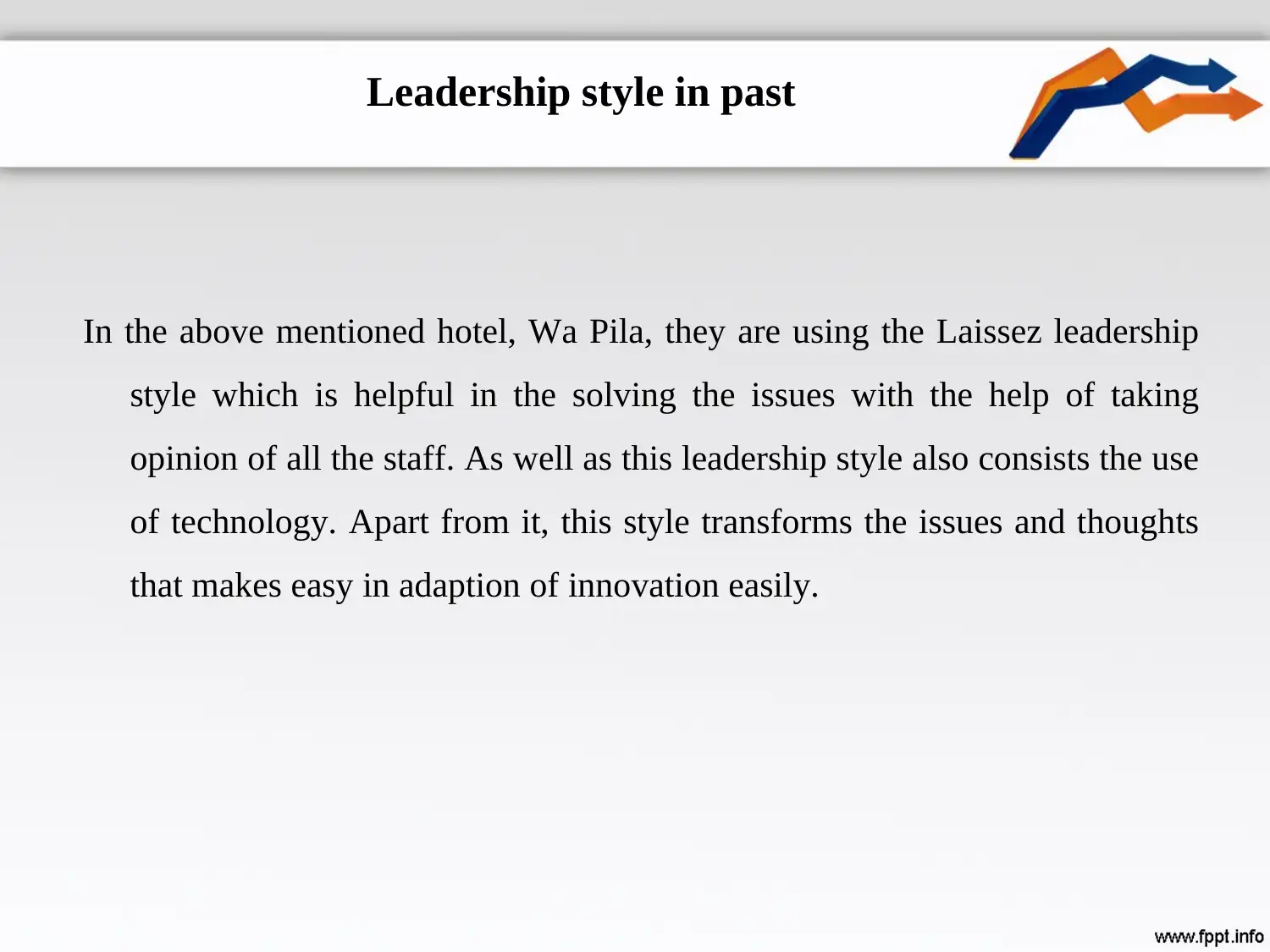
Leadership style in past
In the above mentioned hotel, Wa Pila, they are using the Laissez leadership
style which is helpful in the solving the issues with the help of taking
opinion of all the staff. As well as this leadership style also consists the use
of technology. Apart from it, this style transforms the issues and thoughts
that makes easy in adaption of innovation easily.
In the above mentioned hotel, Wa Pila, they are using the Laissez leadership
style which is helpful in the solving the issues with the help of taking
opinion of all the staff. As well as this leadership style also consists the use
of technology. Apart from it, this style transforms the issues and thoughts
that makes easy in adaption of innovation easily.
⊘ This is a preview!⊘
Do you want full access?
Subscribe today to unlock all pages.

Trusted by 1+ million students worldwide
1 out of 21
Related Documents
Your All-in-One AI-Powered Toolkit for Academic Success.
+13062052269
info@desklib.com
Available 24*7 on WhatsApp / Email
![[object Object]](/_next/static/media/star-bottom.7253800d.svg)
Unlock your academic potential
Copyright © 2020–2026 A2Z Services. All Rights Reserved. Developed and managed by ZUCOL.





